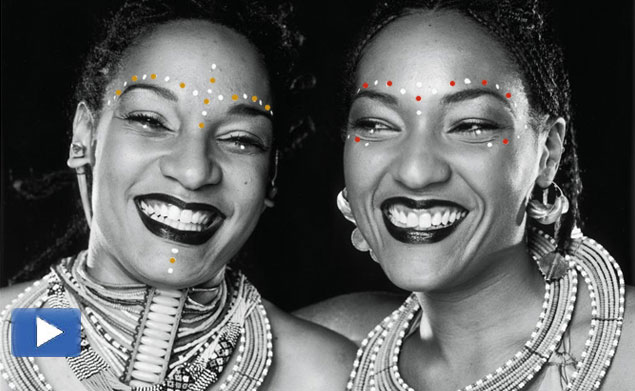The Evolution of the Revolution
Where are Les Nubians? That’s a question that soul music aficionados have been asking about the Afropean duo in light of their “absence” from the scene since the 2003 release of “One Step Forward”. “One Step Forward” was the follow up to “Princesses Nubiennes”, their debut, which still stands as the most commercially successful French album in the U.S.
To answer your question, the Faussart sisters (Célia and Hélène) are here and they’re back with “Nü Revolution”; the EP which was sold exclusively at concerts during their fall tour as well as the LP of the same name which will be released in January 2011. They sat down with Orijin Magazine before a fantastic show at Le Poisson Rouge in New York City and discussed their orijin, African history, the power of women the significance of Barack Obama’s election.
What’s your Orijin?
Hélène: Our orijin as Les Nubians, we are sisters, we are Iwondo, which is part of the great tribe of the Fon in Cameroon and that makes us African, but also French from our father. All of that makes us Afropean, but most of all, making us universal citizens.
What is the significance of a name such as Les Nubians? What does it mean to you?
Célia: We decided to call ourselves Les Nubians to go back to the origins of African civilization. We’ve always been interested by history and also by “if you don’t know where you’re from, you don’t know where you’re going.” It was also a way to talk about Pan-Africanism and not only speak about Cameroon but to explore and share the whole diaspora.
Why did you find it necessary to pay homage to Cheikh Anta Diop through your music?
Hélène: In every album we try to celebrate one person, one character that was very important for African history. On the first album it was Makeda, the Queen of Sheba and on the second album it was Cheikh Anta Diop. Cheickh Anta Diop was a very wise science man. He’s the one who proved that Egyptian people were black. He’s part of that great history and he’s allowing us to walk with pride. And that is exactly what we say in that song, that we feel proud and that we will celebrate and remember his name until the end of time for everything he has done for African history.
Célia: What was great besides his work is that he had disciples. He taught younger generations and our mother got the chance to be one of his disciples.
What did your mother teach you about him?
Hélène: She was doing sociology and was very interested in African tribes, ethnic groups, history, so at some point in her university courses, she had to be a student of Cheikh Anta Diop. He was the light regarding the question of Africa, Africans and how Africa evolved through time and history.
You’ve had great success in America with mostly French language albums, what do you attribute that to?
Hélène: To our originality I would say. Obviously it’s not French (both laugh) because most people don’t really understand it, but they can feel all the matters, emotions and meanings of the songs. And we’re vey happy because we feel that we’re doing universal music. Music that can be understood even without words. We’re very proud of it and that’s our singularity.
I speak French but I have a hard time deciphering what “Makeda” was about; can you break it down for me?
Hélène: Makeda is a song about a mixed couple. We’re basically saying that if you don’t know where you’re from, you don’t know where you’re going, and we know that intermixing exists since the beginning of time: since the Queen of Sheba and King Solomon.
Célia: We also speak about historical falsification: how the Queen of Sheba from the Bible for example, in Cantique des Cantiques, is depicted as beautiful but black. Why couldn’t she be beautiful and black? So there are so many misinterpretations and misrepresentations. The song is also about celebrating our beauty, celebrating who we are through love.
So where have you been? What can you tell your fans about your “absence” from the scene in the past few years?
Les Nubians: We’ve been very busy, very busy! Travelling a lot. Performing in new territories like Brazil, the Caribbean, Africa, writing music, the new album that we are delivering now and also working on a lot of cultural projects like carnivals, writing a musical for children…We’ve been busy.
What is the central theme of your new album “Nü Revolution”?
Hélène: Just like the title, “Nü Revolution”, N.U for New Universe, we live in a new time and everything has shifted. The old nations that were known as “third world” are now the engine of that world, China, India, Brazil. Everything is changing. And “revolution” because “rêve” in French means dream, it’s the evolution of our dreams. What are our dreams about? And also evolution, the evolution of the woman because we truly believe that 2010 and that new era we live in will be managed by women. The universe will take care of balancing our feminine energy out there. The album stands for all of that.
Why do you think women will play such a prominent role?
Hélène: Because it’s part of our nature. And also what we’re living now is a consequence of taking the feminine power out and not taking care of that voice. Wars, abuse, all of that are masculine words; they’re definitely not feminine. I guess that if that world has to change, it has to be through us because we are taking care of children. We are raising children, giving birth.
Célia: And we’re just loving. It’s something that is missing in a man’s world, love. It’s about the return of love
Your new song is called “Liberté “, what is the freedom from?
Hélène: That freedom comes from the election of Barack Obama, it gave us, and a lot of other people around the world wings. We feel like we have wings. We can fly now.

Latest posts by cadmin (see all)
- The Story of a Ghetto Boy - June 28, 2015
- The Rise of The Next Gen. Marley’s | Bob Marley’s grandsons (VIDEO) - May 8, 2015
- Meanwhile somewhere in Sweden, these Swedish African dancers… - March 24, 2015



